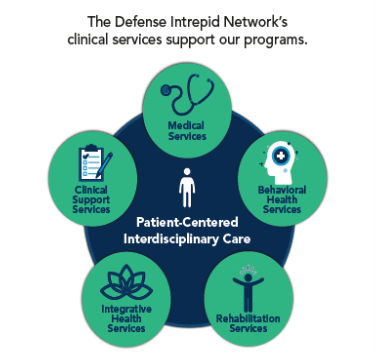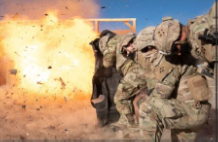Intrepid Spirit Center
About
The Intrepid Spirit Center (ISC) treats service members, retirees and family members who have experienced exposure to a Traumatic Brain Injury resulting in a variety of symptoms that may not be obvious to those around them. These symptoms are often subtle and misunderstood.
The ISC clinic recognizes that for maximum improvement of a patient’s health, a team approach is necessary. The ISC Team consists of medical, rehabilitation, and behavioral health experts in treating mild traumatic brain injury.
Available Programs and Therapies
Art Therapy
Art therapy provides mental health and wellness services through active artmaking and the creative process to enrich the lives of individuals. Many different materials are offered for self-expression and exploration to address stress management, emotional regulation, identity development, and more.
Behavioral Health
The Clinical Social Worker provides counseling services that help patients manage the losses and emotional challenges that often accompany concussions or TBI. As symptoms are being addressed for patients, psychological issues may also be present and addressed.
Some examples of what therapists can address are:
 Case Management
Case Management
The role of the Case Manager is to keep everyone connected and maintain the constant quality communication between the ISC and the patients being served there. The Case Manager works closely with the patient and the providers to assure that the care plan is understood and followed.
Medical Providers
The first professional you will see is an ISC medical provider with specialized training in TBI management. The provider will complete a comprehensive assessment to determine the basis of your symptoms and develop a treatment plan with you to improve and manage those symptoms.
Music Therapy
Music therapy is the evidence-based use of music to accomplish non-musical goals. Music therapists use music to promote your health and well-being. Music therapy services for military service members and Veteran populations integrate a broad range of evidence-based clinical music interventions to facilitate whole health creative arts treatment aimed at recovery, rehabilitation, and social wellbeing (AMTA, 2014). Some common goals focus on motor skills, memory, self-expression, coping skills, processing emotions, reducing stress and anxiety, and pain management.
Neuropsychology
Neuropsychology studies the structure and function of the brain related to specific cognitive processes and behaviors. The neuropsychologist generally does an assessment and recommends treatment which may include cognitive therapy.
Occupational Therapy
Occupational therapists provide an array of evaluations and interventions to enhance performance and promote functional independence in activities of daily living. They may address vision therapy, sleep, relaxation, or driving rehabilitation.
Outpatient Group Programs
Outpatient group programs provide essential support and rehabilitation for individuals who have experiences a TBI. These programs offer a safe and structured environment for patients to enhance their cognitive, emotional, and physical functioning.
Group Programs include:
- Anger management group: A series of three weekly 90-minute sessions
- Cognition group: A series of four weekly classes addressing memory and attention
- iROC: An intensive four day per week, six-week comprehensive outpatient program
- Relaxation: A series of four weekly sessions discussing topics on nervous system regulation, meditation, and mindfulness practices to address stress management
- Sleep Gym: A series of four weekly 60-minute education sessions about sleep habits
- Yoga: A weekly four-week introductory series taught by Comeback Yoga
Physical Therapy
Physical Therapists are movement experts whose goal at the ISC is to address balance, dizziness, aide in headache management, other musculoskeletal pain complaints, and improve physical activity tolerance. Rehabilitation is provided with the goal being to improve function in physical work/home duties and training.
Speech-Language Pathology
Speech Language Pathologists are professionals dedicated to providing the high quality, comprehensive, care, and timely services to individuals who have a wide range of communication and cognitive disorders. Their services include early identification or screening, evaluation, and treatment for speech, swallowing, language, voice and cognitive disorders. Services are provided based on applying the best available research evidence, using expert clinical judgement and considering the patient’s induvial preferences and values.
Information For Commanders
Providers at the ISC follow the specific Traumatic Brain Injury (TBI) protocols outlined by the Defense Health Agency (DHA) in DoDI 6490.11 and DHA-PI 6490.04. Additionally, while we value input from command teams, ISC practitioners are legally bound by the U.S. Army Medical Command Policy 10-042: Release of Protected Health Information (PHI) to Unit Command Officials. The command team’s assistance in making sure the service member attends all of his or her appointments is essential to their recovery.
If you have questions regarding your service member’s schedule or treatment plan, please contact an ISC Nurse Case Manager at 719-524-5217/5218.
Information for families
At the ISC we recognize that the support of loved ones enhances a patient’s recovery. Family is encouraged to participate in education that is offered at the clinic. As a family member, the more you understand about the process your loved one is experiencing, the better support you can provide.
TBICoE Caregiver Guide: www.health.mil/TBICaregiver
Traumatic Brain Injury Center of Excellence (TBICoE)

The ISC teams up with the Traumatic Brain Injury Center of Excellence (TBICoE) to provide training, research and education for service members, providers, family members and xaregivers. TBICoE Education Coordinators (RECs) train medical personnel on the latest techniques for assessment and treatment of TBIs. RECs also provide information and education to service members, family members, caregivers and veterans about the care, recovery, and avoidance of Traumatic Brain Injuries.
TBICoE Educator Phone: 719-526-8636
The TBICoE also has an on-site Research Team actively engaged in finding new ways and methods to improve TBI Care and outcomes for patients. TBICoE researchers also provide info on military TBIs to Congress.